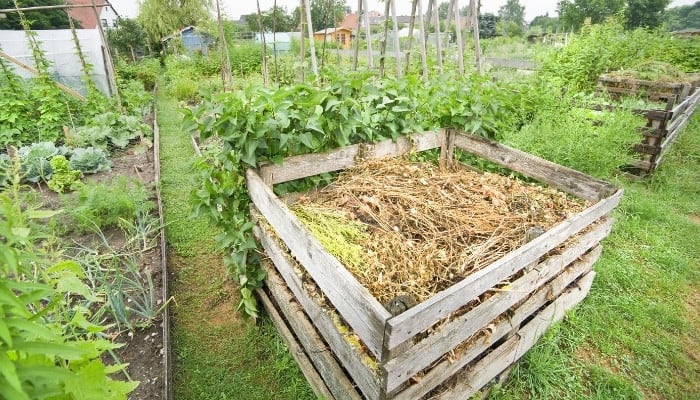Recycling kitchen and lawn waste through composting is an excellent method to create fertile soil for your garden, hence why it’s often referred to as black gold!
However, many people wonder whether they will have problems when it comes to animals and insects being attracted to their compost.
Does compost attract animals and insects? It is true that a compost pile can attract rodents, raccoons, skunks, flies, and other creatures. However, you can avoid most pest problems by regularly turning the pile and maintaining the proper ratio of brown (carbon) and green (nitrogen) ingredients.
Ready to learn more?
In this article, we’ll tell you about the different types of animals and insects that might be drawn to your compost, and we will give you some tips on how to keep them out for good.
Hint – the more you tend to your compost, the better, and not all insects in the compost pile are bad!
Keep reading to find out additional helpful techniques and tips!
Beneficial Insects Attracted To Compost
Not all compost creatures are bad. In fact, there are plenty of beneficial insects that might be drawn to your compost pile.
Isopods
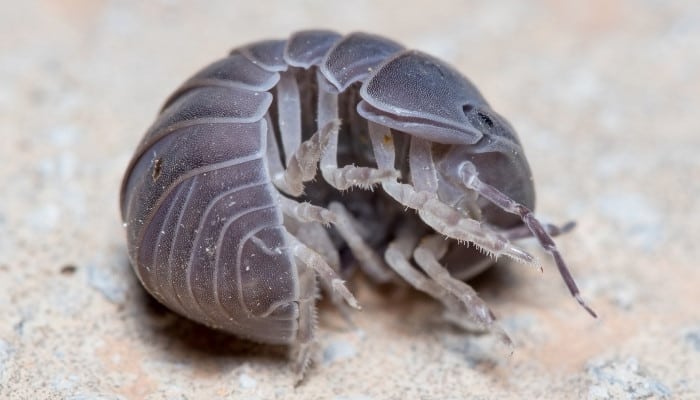
Sometimes referred to as roly polys, pillbugs, sowbugs, or woodlice, isopods are beneficial when they set up shop in your compost pile.
They’ll make your pile their permanent home, and these aren’t just casual visitors.
Isopods are so skilled at breaking down waste that many people set up their own isopod-only composting systems, similar to how you might compost with worms like red wigglers.
Slugs
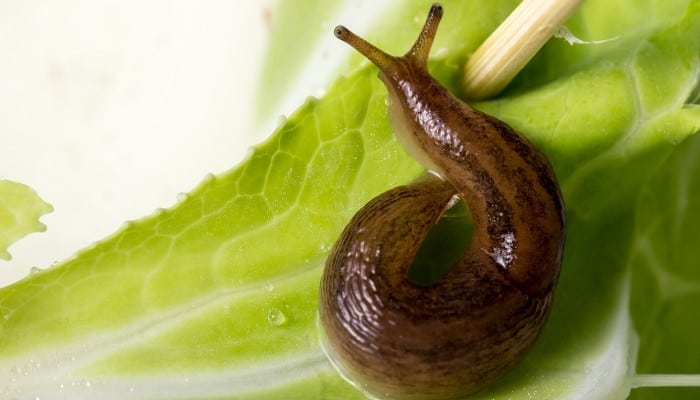
Slugs feed on plant matter and other waste in the compost pile.
Although too many slugs in your compost can indicate that it’s too wet, since slugs like lots of moisture, a few here or there is nothing to worry about.
In fact, they’re welcome!
They can help break material down faster, and as long as your compost isn’t anywhere near your flower beds, you shouldn’t have to worry about them crawling over to feed on your living plants.
Black Soldier Fly Larvae
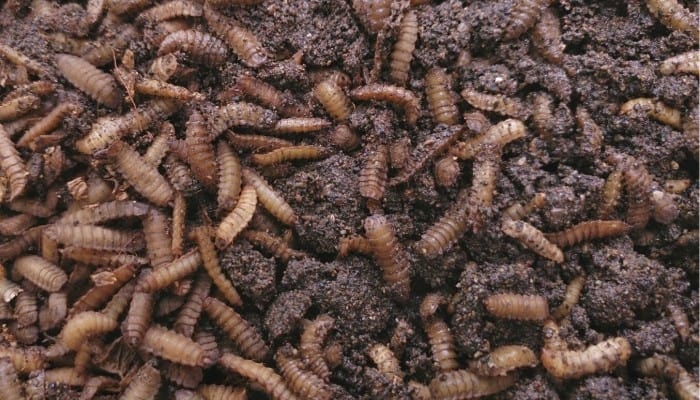
This one is last on our list of beneficial insects attracted to compost because it’s often a matter of debate.
Black soldier flies and larvae can be annoying in the compost pile, and they are unpleasant to look at since the larvae have a maggot-like form.
However, they aren’t bad for your compost and can actually help speed the decomposition process along. If you see them, you may want to leave them be.
Check out our article “Maggots in Compost” to learn how beneficial the larvae actually are.
Are Worms Attracted To Compost?
Worms aren’t insects, but we include them on our list of beneficial insects because many people group them as such.
Whatever you call them, it doesn’t matter. What does matter is that the worm is the star of the compost pile. Here, there is no creature that works harder.
Worms help to aerate and turn the pile, making it break down more quickly so that it can be used in your garden.
Pesky Bugs Commonly Found in Compost
It would be wonderful if all we had to consider were the beneficial insects that hang out in a compost pile. Unfortunately, that’s rarely the case.
Centipedes
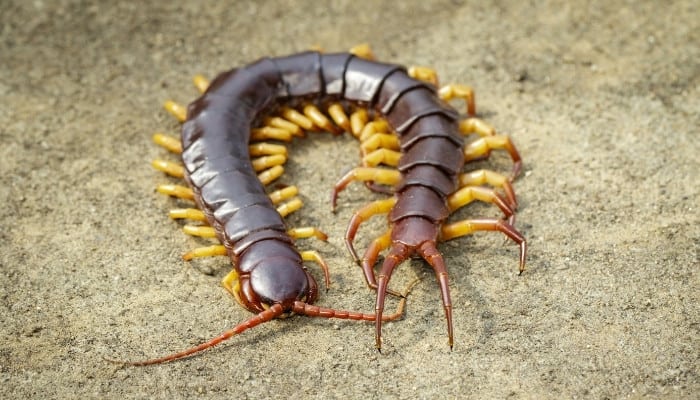
Centipedes have a tendency to freak people out with their many legs!
Although they aren’t directly harmful to the composting process, the issue with too many centipedes in a compost pile is that they eat the other bugs in the pile that actually need to be there, like roly poly bugs.
There is one exception in which you might want to consider leaving centipedes in your compost, and that is if you live in an area where there are cockroaches.
Centipedes eat cockroaches and will help get them out of your compost pile.
Bees and Wasps
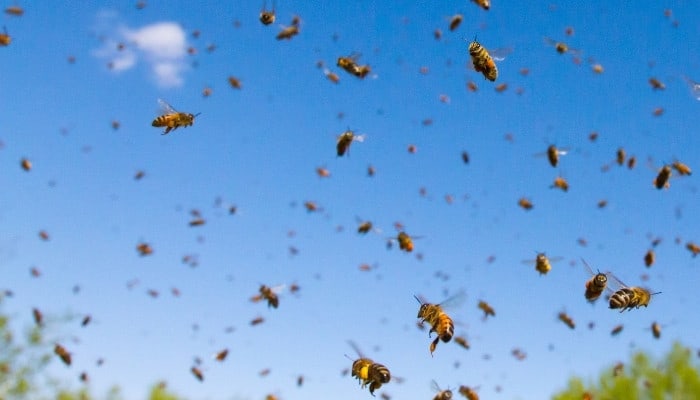
Both bees and wasps can be attracted to the decomposing food in your compost pile – especially if you’ve made the mistake of adding meat products or anything with blood.
These stinging insects won’t harm your compost pile but can make it extremely difficult to work around it without getting hurt.
Ants
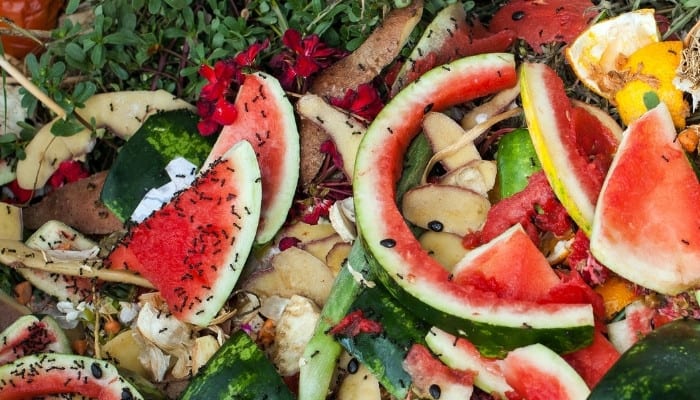
Like bees, ants aren’t necessarily harmful to compost (learn why in our article here).
However, they make it annoying to work around your pile and can attract other pests that eat ants to the pile too.
How To Avoid Pest Problems When Composting
No compost will ever be 100% free from pests, but by following these tips, you can reduce the vast majority of them.
Consider Shredding Material Before Adding
Whenever possible, shred things like cardboard and paper before adding them to your compost.
They’ll decompose more quickly and help other items in the compost, like kitchen waste, break down faster too.
With less food available for insect pests to eat, they’ll be less likely to hang around.
Manage the Moisture
A compost needs to have some moisture in order for the decomposition process to start, but too much moisture can attract bugs (and slow the breakdown process).
Closely monitor the dampness of your compost pile, and avoid adding more water until it is absolutely necessary.
The ideal compost will have about as much moisture as a sponge that’s had the water squeezed out.
Aerate Regularly
Turn your compost regularly to make sure oxygen is getting into all the nooks and crannies of your pile.
This will hasten the process of decomposition, allowing air to get to the center instead of just the edges.
Your compost pile should be kept level and not just built up in the center.
If that happens, only the interior of the pile will heat up while the outside remains cool – attracting all kinds of pests.
You should make it your goal to have the entire compost pile composting at exactly the same rate.
Bury With Dirt
Wet, fresh waste is going to be the most attractive to pests. Any organic or green material should be buried in dirt so that it is less likely to draw in unwanted visitors.
Remember, green matter, like kitchen waste, is especially attractive to flies.
Select the Ideal Bin
You can use an open compost pile to do the majority of your work, but if you find that you’re struggling with pests, you may want to switch to an enclosed bin.
Choose a compost bin that is enclosed and sealed. This may deter pests from taking up residency in your pile.
Many pests can get inside even the tiniest holes, so do some research to figure out which kind of bin will be best to mitigate your particular pest problem.
Avoid Meat, Grease, and Pet Waste
While it might be tempting to use your compost pile as an all-purpose dumping ground, it’s important that you avoid adding things like meat, grease, and pet droppings to the pile.
Things like chicken manure and rabbit droppings are totally fine to add to compost. However, pet waste can harbor diseases along with certain odors that will attract pests.
Meat and grease also have the potential to attract pests, so make sure these go in the trash instead of in your compost.
Maintain the Proper Balance
Most insect pests are drawn to an excess of green matter (nitrogen-rich materials), and so maintaining the proper balance of green and brown matter in your compost can help prevent most pests.
If you’re suffering from any kind of pest problem, consider your ratios.
Add to and adapt your compost ingredients until the pile contains about 50 to 80% brown matter. Without as much food to actively feed on, the pests should head elsewhere.
Add a Splash of Boiling Water
When all else fails and you need to get rid of insects in a pinch, head into your kitchen and prepare a pot of boiling water.
Dump this on your compost and it should kill most insects and larvae that it comes into contact with.
This method is more effective with an enclosed bin because you will be able to lock the heat into the container and kill the pests.
However, you should see results even just pouring water on a small section of an open compost pile.
Does Compost Attract Rats and Mice?
Unfortunately, compost can attract rats, mice, and all other kinds of rodents.
Compost piles are particularly attractive to rodents in the wintertime when they offer a welcome warmth.
Not only that, but compost piles can serve as a source of fresh food. Again, this is especially true in the winter when other food might be scarce.
The best thing you can do is to construct a compost pile that is slightly elevated so that mice and rats can’t get inside. An enclosed bin is best.
However, if this isn’t possible, there are other options.
Rodents don’t like wet bedding, so soaking your pile in the fall when mice are just starting to look for a place to ride out the winter can be helpful.
They also don’t like being distributed. Turn your pile as often as possible, especially in the winter.
Avoid putting food scraps in the compost during the winter, and use a tarp or lid to cover the pile.
While the tarp won’t keep rodents from getting into the pile, it can reduce air circulation that can make it harder for rodents to be comfortable.
Does Compost Attract Dogs and Cats?
Compost itself won’t attract cats and dogs, but kitchen scraps, like fruit and vegetable trimmings along with certain manures, can.
Following the same steps to deter rodents can also help you keep out cats and dogs. An enclosed bin is your best line of defense against these mammalian intruders.
You may also consider installing a fence around your compost to keep animals out.
This is for their sake as well as your own. Chances are, if cats and dogs are getting into your compost pile, they’re your pets.
Compost is filled with moldy food and other waste that can be dangerous to pets since they contain things like mycotoxins.
Are Raccoons and Other Wild Animals Attracted to Compost?
All kinds of animals are attracted to compost piles.
From raccoons to coyotes, badgers to javelina, and foxes to skunks, all kinds of animals will welcome the addition of a compost pile. Even skunks have been known to visit piles!
Deter wild animals by avoiding adding things like fish, meat, bones, grease, oil, and dairy products in the compost bin.
Whenever possible, don’t add blood or bone meal, either.
While the scent of these meals might not be noticeable to humans, raccoons and other wild animals will smell them from a mile away.
Does Compost Attract Mosquitoes?
When a compost pile is done correctly, it should not attract mosquitoes.
The only time compost becomes a breeding ground for mosquitoes is when it is too wet or not turned often enough.
Mosquitoes can also be attracted to exposed plant matter.
Compost piles emit carbon dioxide as they break down, which attracts mosquitoes.
Turning your pile regularly will not only cover up the exposed green matter but will also help slow this release.
Does Compost Attract Roaches?
You’ll find cockroaches where there is food and water, so a compost pile that’s moist or located near a garden hose or another water feature is sure to attract roaches.
Cockroaches may help break waste down into usable soil for you, but you shouldn’t let them hang around if you see them.
They can harbor a variety of diseases, and while they can help process your compost down more quickly, it’s not worth it in the long run.
Are Spiders Drawn To Compost Heaps?
Spiders aren’t necessarily attracted to compost heaps but instead to what’s inside them – their prey. You’ll notice spiders if you have other bugs or insects in your compost pile.
Spiders aren’t harmful in and of themselves. The disadvantage of allowing spiders to lurk in the compost is that they’ll eat beneficial insects that you’d like to keep around.
Should Compost Attract Flies?
Without a doubt, flies are some of the most common pests you’ll have to deal with in and around a compost pile.
Black soldier flies or maggots may indicate an overabundance of nitrogen, while fruit flies will let you know that there is still vegetable waste actively decaying.
For the most part, flies won’t harm your compost pile. They’ll just be annoying to you as you’re trying to work around it.
Of course, some flies can harbor diseases, so it’s best to take steps to mitigate flies whenever possible.
Why Are There Maggots in the Compost?
It might gross you out to see maggots in the compost pile, but they aren’t doing any harm there.
In fact, maggots play a valuable role in breaking down nutrients and returning them to the soil.
If you see lots of maggots, it’s likely because you have too much nitrogen in your compost pile. Adding more brown (carbon-rich) ingredients can help.
What Should Compost Smell Like?
A properly balanced compost should smell earthy and like dirt – but not bad or foul.
If it does have a bad odor, there’s something wrong with your pile, and it’s not heating up as it should. That’s especially true if it smells rancid or rotten.
The exception to this is if you are composting manure. When you compost manure, you can expect a bit of an odor, though it shouldn’t be overpowering.
Conclusion
For the most part, bugs and other animals play a valuable role in the compost pile.
However, many can carry diseases and can be a nuisance as you’re trying to work your pile.
Consider an enclosed compost bin along with proper management tips, as described above, to keep unwanted visitors far away from your compost.

